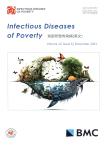Experiences and perceptions of COVID‑19 infection and vaccination among Palestinian refugees in Jerash camp and Jordanian citizens:a comparative cross‑sectional study by face‑to‑face interviews
作者机构:Department of ImmunologySchool of Medical SciencesUniversiti Sains MalaysiaKota Bharu 16150Malaysia Department of Medical Laboratory SciencesFaculty of Applied Medical SciencesThe Hashemite UniversityP.O.Box 33012713133 ZarqaJordan 不详
出 版 物:《Infectious Diseases of Poverty》 (贫困所致传染病(英文))
年 卷 期:2022年第11卷第6期
页 面:101-102页
核心收录:
学科分类:1004[医学-公共卫生与预防医学(可授医学、理学学位)] 100401[医学-流行病与卫生统计学] 10[医学]
基 金:Universiti Sains Malaysia USM
主 题:SARS-CoV-2 Vaccine rollout Health equity Refugee vaccination Vaccine hesitancy Adverse efects
摘 要:Background:During the COVID-19 vaccination,the access to vaccines has been unequal among countries and indi‑viduals,for example low-income countries displayed signifcant low levels of ***,most refugees are living in developing low-income countries which struggling to access the essential health-care services including ***,the objective of this study was to assess the experiences and perceptions of COVID-19 infection and vaccination among Palestine refugees in Jerash camp compared to resident Jordanian ***:A face-to-face interview-based comparative cross-sectional study was carried out among Palestine refu‑gees in Jerash camp located in northern Jordan and Jordanian citizens from diferent cities in Jordan from October,2021 to March,2022.A Chi-square test was used to determine the diferences in the experiences and perceptions of COVID-19 infection and vaccination between Palestinian refugees and resident Jordanian *** regres‑sion analysis was performed to predict factors associated with the beliefs,barriers and hesitancy towards COVID-19 ***:The total number of participants was 992,with 501(50.5%)Palestinian refugees and 491(49.5%)Jordanian *** participants(64.1%)who have never been tested for COVID-19 were from the refugees(P0.001),whereas about 80.3%of the participants tested for COVID-19 at private healthcare institutions were citizens(P0.001).While 70.0%of the participants who tested positive for COVID-19(n=303)were from the refugees(P0.001).Com‑pared to the citizens,the refugees had signifcantly lower levels of beliefs about the safety(P=0.008)and efciency(P0.001)of COVID-19 *** also had lower rates of vaccine hesitancy(P=0.002)and vaccine uptake(P0.001),and a higher rate of facing difculties during registration for COVID-19 vaccination(P0.001).Furthermore,refugees have more negative attitudes toward the importance and implementation of COVID-19 precautionary activi



